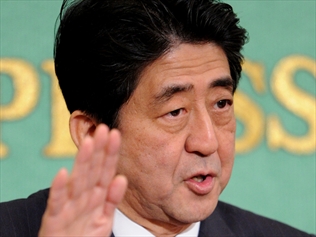
The unveiling of Prime Minister Shinzo Abe's long-awaited growth strategy did little to stem the recent slide in Japanese stocks, with the Nikkei 225 closing down 3.8 per cent yesterday.
And analysts warned that the measures announced -- which included new moves to allow its giant pension funds to invest offshore and in equities -- did not go far enough to help Japan emerge from decades of deflation.
Mr Abe says Abenomics will expand Japan's moribund economy by 2 per cent a year (or 3 per cent in nominal terms) and the Bank of Japan wants to drive inflation to an annual 2 per cent through "unlimited" quantitative easing.
"I think the most important target to achieve is per capita gross national income," Mr Abe said yesterday while launching the growth strategy.
"That's because the aim of our growth strategy is nothing other than to create jobs for enthusiastic people and raise take-home pay for those working hard."
While the Prime Minister said the strategy was also aimed at helping the private sector to become the "engine of Abenomics", it did not contain the across-the-board corporate tax cut sought by industry groups or any major labour market deregulation.
The reluctance to move on corporate tax may be because the Abe government and the BoJ have one eye on the bond market, which has been racked by alarming gyrations in recent weeks as bond holders ponder what will become of their modest returns if the BoJ succeeds in its inflation goal. Yields on Japanese 10-year bonds have doubled in the past two weeks.
Japan, with its high public sector debt, is seen as vulnerable to a surge in bond yields. It hopes a coming hike in consumption tax will go some way to reducing deficits and overall debt levels without constricting growth.
One of the most significant new elements of the strategy unveiled yesterday involves directing government pension funds -- which hold 8 per cent of Japanese government bonds and control a pool of two trillion yen (about $20 billion) -- to buy more stocks, in Japan and overseas.
While the move may exacerbate Japan's bond market problems (these conservative funds traditionally hold big portfolios of low-yielding Japanese government bonds), the Abe government hopes it will boost returns and therefore minimise government liabilities.